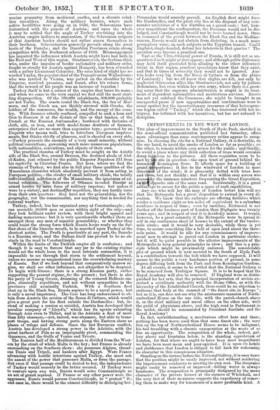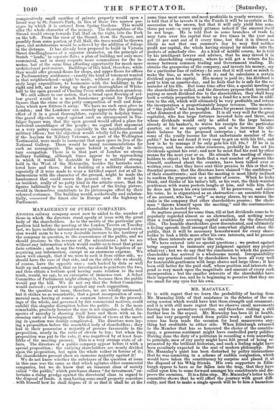IMPROVEMENTS IN THE WEST OF LONDON.
THE plan of improvement to the South of Hyde Park, sketched in the semi-official communication published last Saturday, offers more advantages than some contemporary critics appear to recog- nize. In choosing the site for a National Gallery, it is desirable, on the one hand, to avoid the smoke of London as far as possible ; on the other, to remain within easy access for the public ; and thirdly, to avoid a place where any thick collection of trees would occasion damp injnrious to the pictures. All these requisites seem to be
met by site in question—the open tract of ground behind the housea* Kensington Gore. It affords space for a building of d portions ; it lies to the windward of London in most 'red* of the wind ; it is pleasantly dotted with trees here and there, but not thickly ; and that it is within easy access was et pray re
by the immense numbers frequenting the Great Exposition, au** oliposite side of the same road. Incidentally, it is a great ad4an age to secure for the public a space of such capabilities.
Any one who will lay the map of London before him will see that the Metropolis has a great disposition to extend in every di- rection. We know that the railways are offering facilities which render a residence eight or ten miles off equivalent to a suburban residence in respect of time ; even by omnibus, Richmond is not further off the business part of London than Highgate was twenty years ago ; and in respect of cost it is decidedly nearer. It would, however,, be a great calamity if the Metropolis were to spread it- self in one continuous sheet of houses to the extent of the twelve- mile circle ; and it would be very desirable, while there is yet
time, to secure something like a belt of open land about the three- mile point. It would be idle for any commissioners of improve- ment now to attempt to parcel out London in particular circles ; but it will be quite possible in the ulterior improvements of the Metropolis to keep general principles in view ; and this is a prin- ciple which might be proximately enforced. The considerable plot of ground which is now secured to the South of Hyde Park is a contribution towards the belt which we have supposed. It will secure to the public a very handsome portion of ground, in some degree differing both from the Park and from Kensington Gardens.
At all events, it seems to be settled that the National Gallery is to be removed from Trafalgar Square. It is to be hoped that the Royal Academy will also be removed. If England were so distin- guished for her arts, that the principal incorporation of artists ex- ercised a coordinate authority with the Home Office, or with the hierarchy of the Established aura, there could be no objection to enthrone that body at the summit of " the finest site in Europe "; but as it is, one does not see why the aristocratic mansion of North- umberland House on the one side, with the parish-church above it, or the chief military and naval offices on the other side, with the guild of physicians above, and the high road to Parliament in the midst, should be commanded by President Eastlake and the Royal Academy ! in fact, notwithstanding a meritorious effort here and there,
nothing has been worse used than that same finest Bite ; the very lion on the to of Northumberland House seems to be indignant, his tail trembling with a chronic exasperation at the waste of so fine an opportunity. The composition of the whole, indeed, gal- lery above and fountains below, is the standing opprobrium of London, for that where we ought to have been most magnificent we have been most mean and poor-spirited. It is upon its hotels and clubhouses that London is obliged to fall back for redeeming its character in this conspicuous situation.
Standing on the terrace before the National Gallery, it is easy to see
that the position might be vastly improved, not without rendering the improvement conducive to meeting its own cost. The fountains might easily be removed or improved—falling water is always handsome. The composition is principally disfigured by the mean character of the private houses at the corners of Whitehall, and the very fact of their meanness suggests the expediency of remov- ing them to make way for tenements of a more profitable kind. A
comparatively small sacrifice of private property would open a broad way to St. James's Park, in lieu of those two narrow pas- sages by which it is entered from Spring Gardens. This would alter the whole character of the scenery. The thoroughfare of the Strand would sweep towards Pall Mall on the right, into the Park on the left. From the view of the Strand, from the Square, and possibly from some portion of Pall Mall, the trees would be thrown open, and architecture would be relieved by the addition of foliage in the distance. It has already been proposed to build in Victoria Street dwellinghouses of a superior character, on the principle of Scotch " lands, ' in separate flats • a plan of building not only more economical, and in many respects more commodious for the in- mates, but at the same time affording opportunity for much more architectural pretensions. Buildings of this kind, therefore, while they would offer ground-floors for shops, and upper floors for offices or Parliamentary residences—exactly the kind of tenement wanted in that neighbourhood—might be made, without a disproportion- ately large expenditure, to harmonize with the buildings to the right and left, and so bring up the great thoroughfare of White- hall to the open ground of Charing Cross with unbroken grandeur.
We still adhere to our notion, that a broad open flooring of yel- low gravel would be a much handsomer ground for Trafalgar Square than the stone or the petty composition of wall and foun- tains which now fritters it away. We have no such open place in London ; and the Londoner can scarcely appreciate the pleasing -effect of it in a great thoroughfare, especially in holyday times. One grand objection urged against such an arrangement in Tra- falgar Square was, that the open ground would afford a place for turbulent assemblages of the people : we regard that argument as a very paltry conception, especially in the neighbourhood of military offices ; but the objection would wholly fall to the ground if the Asylum for Military Veterans, as part of the Wellington Testimonial, were made to surmount that open space in lieu of the National Gallery. There would be many recommendations for such an arrangement. The space behind is already in mili- tary occupation. There is in that part of London no strong military building, although times appear to be approaching in which it would be desirable to have a military strong- hold in the West of the Metropolis, besides the barracks scat- tered here and there. But a building of a military character, especially if it were made to wear a fortified aspect not at all in- harmonious with the character of the ground, might be made the handsomest that could crown the general view. It would be an incident, really of no petty kind in the artistic sense, that the figures habitually to be seen in that part of the living picture, would in themselves contribute to its picturesque effect by their coloured costumes. The building would, aesthetically and substan- tially, command the finest site in Europe and the highway to Parliament.



























 Previous page
Previous page